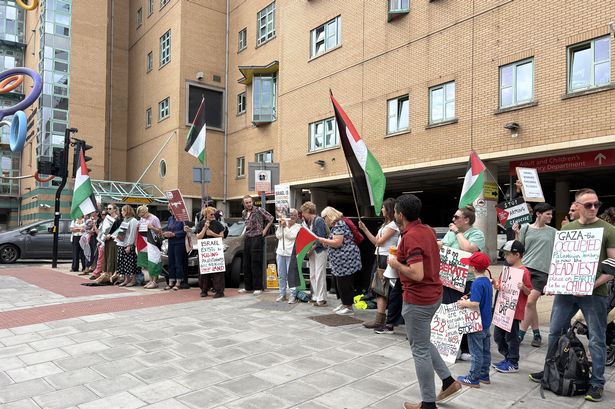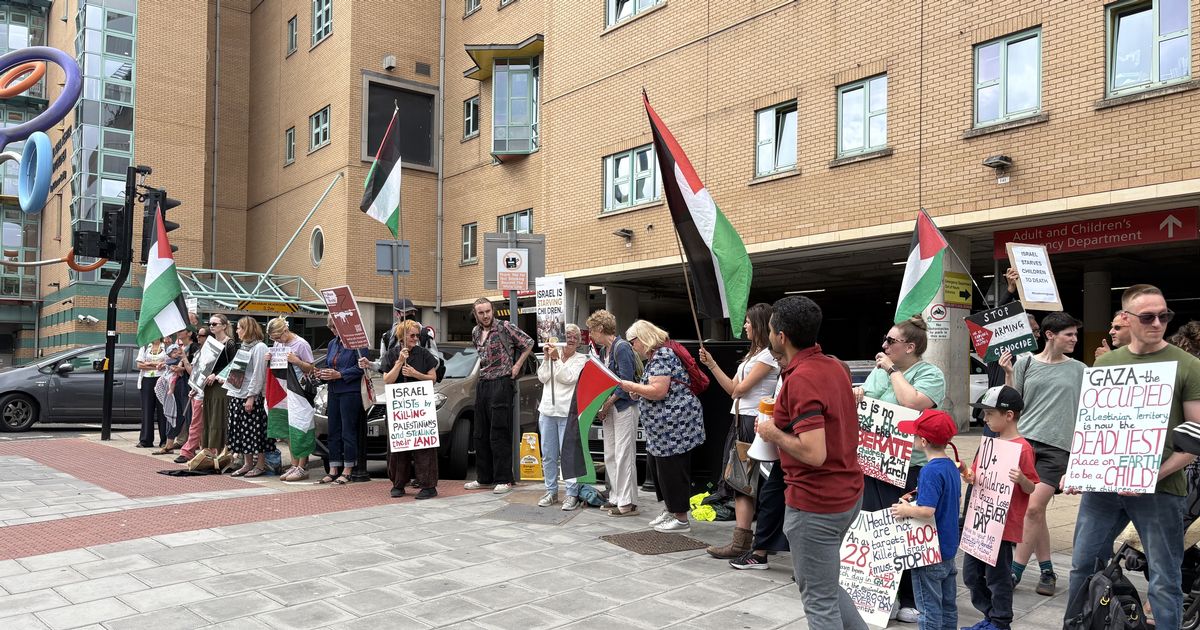A series of rallies are planned demanding an end to the blockade A group of about 20 healthcare workers gathered outside the Bristol Royal Infirmary on Thursday to demand an end to the Gaza aid blockade
A group of about 20 healthcare workers gathered outside the Bristol Royal Infirmary on Thursday to demand an end to the Gaza aid blockade
Healthcare workers gathered outside the Bristol Royal Infirmary (BRI) today demanding an end to the aid blockade in Gaza. The demonstration in Upper Maudlin Street comes a day after more than 100 charity and human rights groups said Israel’s blockade and military offensive are pushing Palestinians in the Gaza Strip towards starvation.
Experts say Gaza is at risk of famine because of Israel’s blockade and the offensive launched in response to Hamas’s attack on October 7 2023. The protest outside of the BRI started around 12pm this afternoon(Thursday, July 24) and was organised by Healthcare Workers for Palestine Bristol, with support from Palestine Solidarity Campaign (PSC).
One healthcare worker, who asked not to be named due to fears of workplace repercussions, said a hospital was a fitting place for the protest and slammed the UK government for its response. Passers-by occasionally signalled their support for the protest by tooting their horns and shouting from their cars.
“People have questioned why we’re outside a hospital, and particularly a children’s hospital, because they feel it’s disrespectful,” she said. “We’re outside a hospital to highlight the systemic attacks on healthcare that Israel has inflicted on the Palestinian people in Gaza and the West Bank.
“Right now, with the blockade of food, there is no food to feed the health and aid workers, they are having to work starving. We have seen health workers, aid workers, journalists collapsing on video because of exhaustion and starvation.”
Foreign Secretary David Lammy offered perhaps the government’s strongest criticism of Israel to date on Monday. He joined ministers from 27 other countries in condemning Israel for depriving Palestinians in Gaza of “basic human dignity”. Prime Minister Sir Keir Starmer also described the situation on the ground as “intolerable.”
However, protesters outside the BRI called for actions, not words. They said the government needed to apply widespread sanctions on Israel.
“This needs to stop,” the healthcare worker said. “We cannot and will not just listen to the empty words from David Lammy and Keir Starmer. We need sanctions and nothing less will do.”
The protest was one of a series of actions planned around Bristol this weekend in support of Palestine. A large crowd is expected to gather on the Cascade Steps in the city centre on Friday evening for a protest rally.
On Saturday, there will be a welcome rally in Castle Park for the cyclists involved in the Big Ride for Palestine, who have been cycling across the country to raise awareness of the Palestinian cause.
“The pro Palestine movement in Bristol is much older [than just this weekend], but we are getting bigger and bigger as people see the injustice that we are letting happen in Palestine,” Bristol Palestine Solidarity Campaign chair Dr Eldin Fahmy said. “Opinion polls show people support an arms embargo on Israel, they support a trade embargo on Israel, so I think we have public opinion on board but we have to put pressure on politicians to act on that.”
The protests in Bristol are part of a global call to action. In an open letter on Wednesday (July 23), 115 organisations, including major international aid groups such as Doctors Without Borders, Mercy Corps and Save the Children, said they were watching their own colleagues, as well as the Palestinians they serve, “waste away”.
Israel’s Foreign Ministry rejected the criticism and accused the groups of “echoing Hamas’s propaganda”. It said it has allowed around 4,500 aid trucks to enter Gaza since lifting a complete blockade in May, and that more than 700 are waiting to be picked up and distributed by the United Nations.
Sign up to receive daily news updates and breaking news alerts straight to your inbox for free here.
That is an average of around 70 trucks a day, the lowest rate of the war and far below the 500-600 trucks a day the UN says are needed, and which entered during a six-week ceasefire earlier this year.
The UN says it has struggled to deliver aid inside Gaza because of Israeli military restrictions, ongoing fighting, and a breakdown of law and order. An alternative system established by Israel and an American contractor has been marred by violence and controversy.
